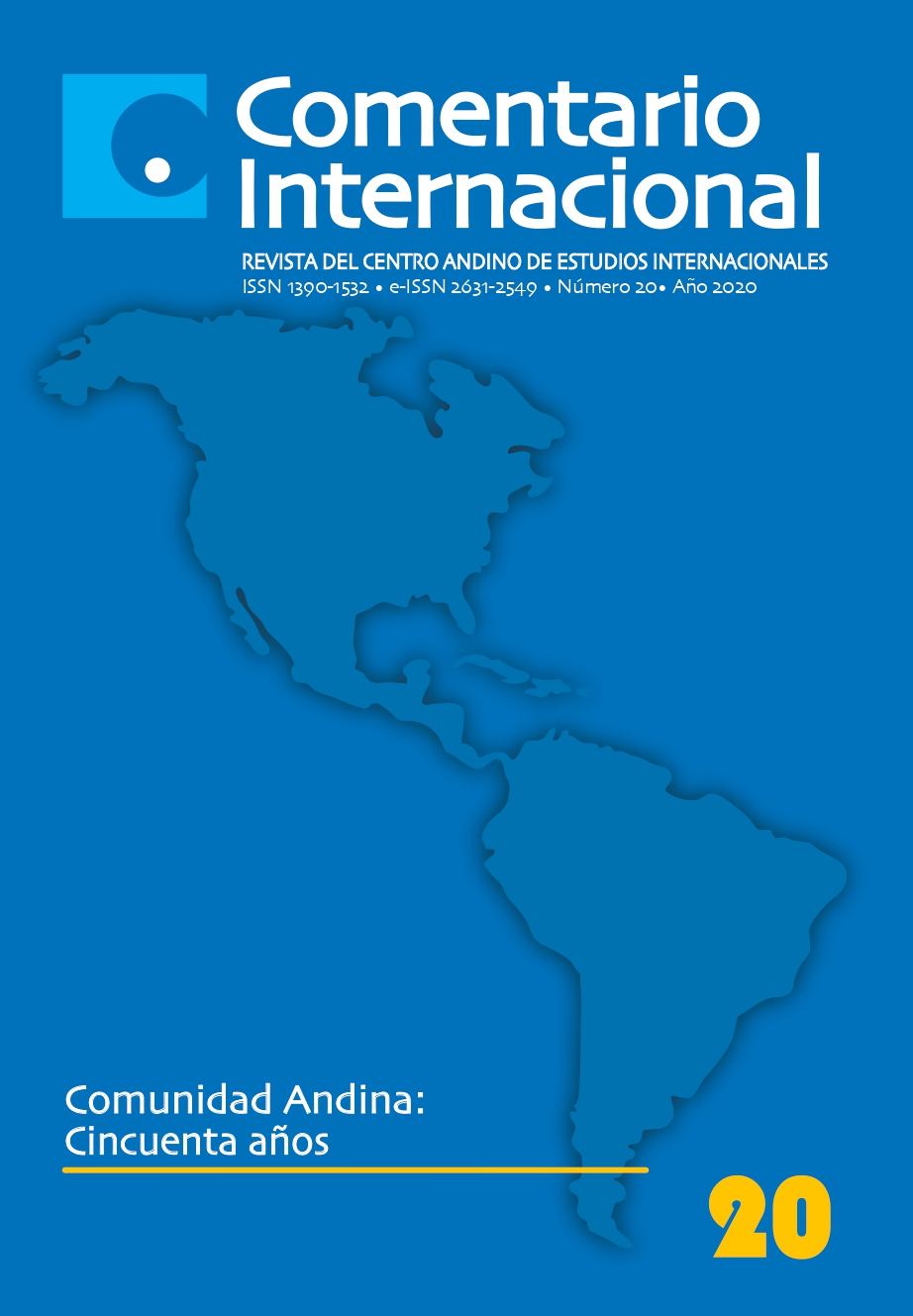The Andean Community in the global context Post-reengineering 2014: a look from the collective action
DOI:
https://doi.org/10.32719/26312549.2020.20.1.5Keywords:
Comunidad Andina, acción colectiva, regionalismo, globalización, gobernanza, bienes colectivos, reingeniería.Abstract
The Andean Community (CAN) is a regional integration bloc and its progress has always been in debate. The present essay makes use of the theoretical tool of the political sciences, specifically, the theory of collective action, for the analysis of the integration process from the 2014 reengineering onwards. The results of the analysis allow to determine that each member gives a different valuation to the identification of the so-called collective assets of the block. Under this logic, this assessment has a direct impact on the success of the international organization in the context of a globalization that, increasingly, requires global results from a governance perspective.
Downloads
References
● Barkin, Samuel. 2013. International Organization: Theories and Institutions. Second Edition. New York: Pallgrave Mcmillian.
● Baylis, John, Steve Smith, y Patricia Owens. 2014. The Globalization of World Politics: An Introduction to International Relations. Oxford: Oxford University Press.
● Casas Casas, Andrés y Correa, María Elvira. 2007 ¿Qué pasa con la Comunidad Andina de Naciones – CAN? Colombia: Pontificia Universidad Javeriana de Colombia. En Revista Papel Político vol. 12, núm. 2, julio-diciembre. p. 591-632.
● Cram, Laura. 1998. The EU institutions and Collective Action: Constructing a European Interest? En Greenwood, Justin y Aspinwall, Mark Eds. Collective Action in the European Union: Interests and the new politics of associability. New York: Routledge Editores. p. 63-80.
● Held, David, McGrew, Anthony, Goldblatt, David, y Perraton, Jonathan. 1999. Global Transformations: Politics, Economics and Culture. Stanford: Stanford University Press.
● Kaminski, Marek. 2003. The Collective Action Problems of Political Consolidation: Evidence from Poland. En Heckelman, Jac C. and Coates Denis (Ed). Collective Choice Essays in Honor of Mancur Olson. Baltimore: Editorial Springer. p. 71-89.
● Olson, Mancur. 1992. La lógica de la acción colectiva: Bienes Públicos y la Teoría de Grupos. México: Limusa Noriega Editores.
● Nicoli, Franceso. 2019. Neofunctionalism revisited: Integration Theory and varieties of outcomes in the Eurocrisis. En Journal of European Integration. Disponible en el enlace digital: DOI 10.1080/07036337.2019.1670658.
● Rosenau, James N. 1997. Along the Domestic-Foreign Frontier: Exploring Governance in a Turbulent World. Cambridge: Cambridge University Press.
● Saurugger, Sabine. 2007. Review: Collective Action in the European Union: From Interest Group Influence to Participation in Democracy. En Comparative Politics vol. 39, No. 4 Jul. p. 481-500.
● Scheuerman, William. 2018. Globalization. Stanford: Stanford University Press. En Edward N. Zalta Ed. The Stanford Encyclopedia of Philosophy. Winter 2018 Edition. Disponible en el enlace digital: https://plato.stanford.edu/archives/win2018/entries/globalization/
● Tussie, Diana. 2020. El coronavirus va a profundizar la resistencia a la globalización. Argentina: Diario la Nación, 05 de abril de 2020. Disponible en el enlace digital: https://www.lanacion.com.ar/economia/diana-tussieel-coronavirus-va-profundizar-resistencia-globalizacion-nid2351084
● Weiss, Thomas. 2013. Global Governance: Why? What? Whither? New York: Polity.
Downloads
Published
How to Cite
Issue
Section
License
Authors who publish in this journal accept the following conditions:
1. The authors keep the copyright and assign to the journal Comentario Internacional the right of the first publication, with the work registered with the attribution license of Creative Commons, which allows third parties to use what is published whenever they mention the authorship of the work and the first publication in this journal.
2. Authors can make other independent and additional contractual arrangements for the non-exclusive distribution of the article published in this journal (eg, include it in an institutional repository or publish it in a book) provided they clearly indicate that the work was published for the first time in Comentario Internacional.







